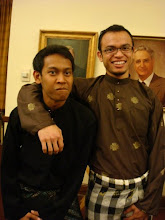 I know it for sure when I started diving into actuarial science world and going back and forth between statistics and theatre classes which has taught me about looking into a matter with different lenses. Small lens has taught me the importance of personal skills, i.e. the technicality of actuarial world. I have learned different Actuarial Models in evaluating options, statistical software, i.e. SAS, STATA and R, in data mining. Besides, I have been taking actuarial exams to test my skills, which I have failed all of them (P and FM twice, and MLC). The failure has brought me into a bigger lens. I was an overachiever. I had to win everything using all possible means, but when I failed should I choose to keep digging into the same rut? Then, I moved on. Learning from the failure, I pursued my degree in Actuarial Science when some of my colleagues decided to drop out of the game. I know I am passionate about this field. The bigger picture always brings me to a larger purpose of this field. The psyche of human beings I learned comprehensively in my theatre classes, I think would be useful in this position. I'm always looking forward of an exciting challenge.Today's financial world when looking from optimistic eyes is an exciting condition in testing existed models and coming out with new models.
I know it for sure when I started diving into actuarial science world and going back and forth between statistics and theatre classes which has taught me about looking into a matter with different lenses. Small lens has taught me the importance of personal skills, i.e. the technicality of actuarial world. I have learned different Actuarial Models in evaluating options, statistical software, i.e. SAS, STATA and R, in data mining. Besides, I have been taking actuarial exams to test my skills, which I have failed all of them (P and FM twice, and MLC). The failure has brought me into a bigger lens. I was an overachiever. I had to win everything using all possible means, but when I failed should I choose to keep digging into the same rut? Then, I moved on. Learning from the failure, I pursued my degree in Actuarial Science when some of my colleagues decided to drop out of the game. I know I am passionate about this field. The bigger picture always brings me to a larger purpose of this field. The psyche of human beings I learned comprehensively in my theatre classes, I think would be useful in this position. I'm always looking forward of an exciting challenge.Today's financial world when looking from optimistic eyes is an exciting condition in testing existed models and coming out with new models.Ask most people what they want out of life and the answer is simple - to be happy. Maybe it's this expectation though of wanting to be happy that just keeps us from ever getting there. I am a fresh graduate. I have no experience in Actuarial world. I failed my actuarial exams. But, one thing for sure is that I want to be happy and I am choosing this field because I am pretty sure this is the right job to make me happy.



